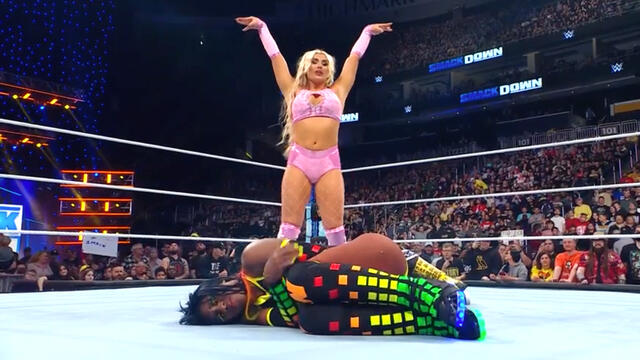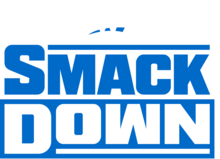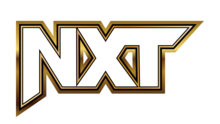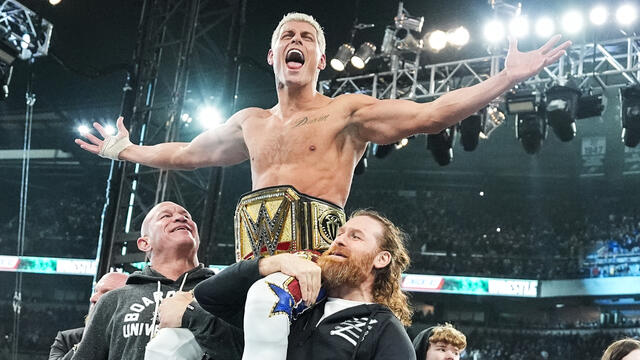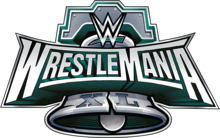“One life, one shot”: Mark Andrews on his quest to become WWE’s first United Kingdom Champion

Mark Andrews has been traveling the world since he was a teenager, honing his craft as one of the world’s premier highflyers, waiting for the right opportunity. That chance at glory is just days away, as the Welshman will take part in the 16-man tournament to crown the first-ever WWE United Kingdom Champion.
WWE.com sat down with Andrews to discuss the tournament and what it means to a generation of British wrestlers, what gives him an advantage over the field, and how he balances an in-ring career with being in the pop-punk band Junior.
Check out Mandrews' official profile | Full WWE UKCT coverage
WWE.COM: What did you think when you first heard about the WWE United Kingdom Championship Tournament?
MARK ANDREWS: I was incredibly excited that WWE had chosen to come to the U.K. and feature a lot of British talent. I feel like this country has a strong history of wrestling, with the likes of William Regal going to the States and becoming an icon and hero for wrestlers across Britain. Now, they’re bringing this tournament to the U.K. and showing off what the U.K. has been for the last 20 years without the platform to show it to the world. I’m incredibly excited to be a part of it.
WWE.COM: For members of the WWE Universe who might not be familiar with the style, how would you describe the British wrestling style?
ANDREWS: I think that current British wrestling is just a modernized take on old-school British wrestling. You look at the greats from back in the day, like William Regal, Fit Finlay and Johnny Saint, we still have the roots of that, it’s very mat wrestling and chain wrestling-based, but I feel like there’s been a big impact from America, Japan, Mexico, the countries that people have traveled to and brought back their techniques.
It’s very much rooted in mat wrestling, but over the years, we’ve developed a hybrid style of British wrestling and those others put together.
WWE.COM: Do you think being a highflyer gives you an advantage in this tournament?
ANDREWS: I do, because, as I said, Britain is known for mat-based wrestling, whereas you normally find more highflying wrestling in places like Mexico and Japan. To have a highflyer in the U.K. is a rarity. I consider that an advantage.
It’s an easy way to escape from mat-based wrestlers, or heavyweight wrestlers in general. It definitely makes me stand out from the bunch if I can flip around the ring and entertain the crowd while doing so.
WWE.COM: You’ve also wrestled in America and on television. Does that experience under the bright lights in high-pressure situations give you an upper hand?
ANDREWS: That definitely gives me an edge. Though I’m only 24 years old, and this country is full of very young wrestlers, I’m one of few who has the experience I do. This is my 11th year in the industry, which for a 24-year-old, is quite hefty. From wrestling abroad so much – all across Europe, America and Canada – I do think that I have experience the other competitors don’t have, in front of the lights, cameras and TV crowds. It’s a big advantage.
WWE.COM: What are you hoping to get from the WWE United Kingdom Championship Tournament?
ANDREWS: I’m hoping that this can be the platform for me to show the world what they’ve been missing. It’s my opportunity to show the world what I’ve been training for over the last 10 years. I’m a highflying wrestler, but I’m also in a band, and I try and incorporate that presence, with stage dives and stuff like that, into my performance.
I base my life around the motto “one life, one shot.” Which is how I’m approaching this tournament, that “you only live once” attitude. I hope the WWE fans can get behind that.
WWE.COM: You mentioned that you were in a band. What instrument do you play?
ANDREWS: I’m originally a guitarist, but now I’m a vocalist and bassist. I dabble in various instruments, but right now it’s that.
WWE.COM: Does performing in a band compare at all to getting in the ring?
ANDREWS: Definitely. It’s very close, yet quite far, in an odd way. I think it’s helped my performance. I’d been wrestling for eight years before I ever got on stage with an instrument. I realized that crowd participation and interaction is completely different when you’re outside the ring. I like to think it gives me an edge over the other competitors.
But, I’ve learned from wrestling and music that interacting with the crowd is the most important thing. It doesn’t matter whether you’ve got a bass guitar or you’re doing a Shooting Star Press, you need to connect with the crowd.
WWE.COM: On top of wrestling and your band, you’re also a videographer and have designed your own clothing line. Where do you find the time to do all of this stuff?
ANDREWS: This is a very regular question in my life. I do a lot of plate spinning, a lot of juggling with my time. My pattern of thought, ever since I was a teenager, surrounding myself with wrestling, is “If I have something to do with my spare time, I do it.” I’m not the kind of guy to just sit in front of a TV and watch the newest season of whatever.
My way of relaxing is being productive, as odd as that might sound. If I’m not wrestling or in the gym, I’m playing an instrument or at band practice. If I’m not at band practice or wrestling, then I’m editing a video or designing a shirt, whatever it’ll be. It’s something I find enjoyment in, it’s escapism for me.
WWE.COM: You’ve come up in the industry with a lot of the competitors in the tournament, guys like Pete Dunne. What does it mean for all of you to be a part of this?
ANDREWS: That’s probably the most special part of this tournament, for me. I had Pete Dunne’s very first match. He was 12, I was 14. Ever since then, we’ve wrestled each other constantly around the world.
When he was 19 and I was 21, we did a 10-week tour of America, wrestling as much as we could. We had a hotel for a few nights. After that, we slept on couches and lasted the whole time, wrestling each other, getting paid 20 bucks, real low amounts, just to survive. I’ve traveled the world with Pete. If it wasn’t for each other, we probably wouldn’t be where we are. I’ve learned a lot from him and I hope he’s learned from me. On top of that, guys like Tyler Bate, who Pete had a hand in training, he was part of our group coming up. Guys like Dan Moloney and even Trent Seven, he was there with us.
To see so many people I’ve worked with up and down the country for the last 12 years, it’s awesome to see this is the payoff. This is the opportunity we’ve been waiting for.
WWE Shows Latest Results
Raw results, April 15, 2024: Chad Gable viciously attacks Sami Zayn after losing to Zayn in Intercontinental Title Match!
Full ResultsSmackDown results, April 19, 2024: Tiffany Stratton introduces Bayley and Naomi to Tiffy Time with a sneak attack
Full ResultsWWE NXT results, April 16, 2024: Trick Williams defeats Carmelo Hayes in a Steel Cage Match
Full Results








